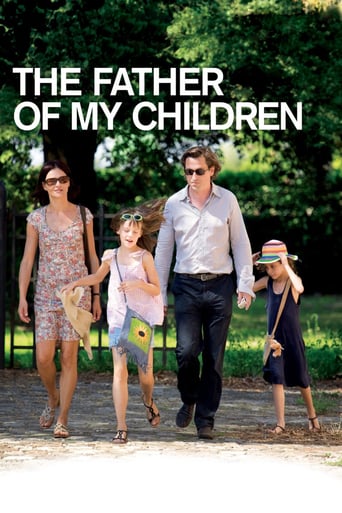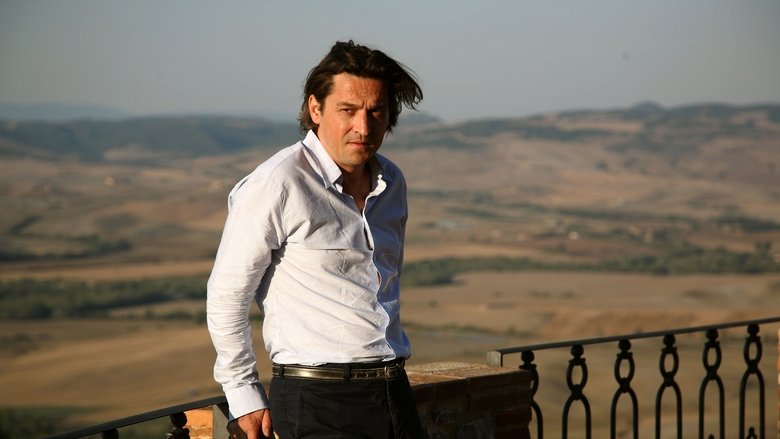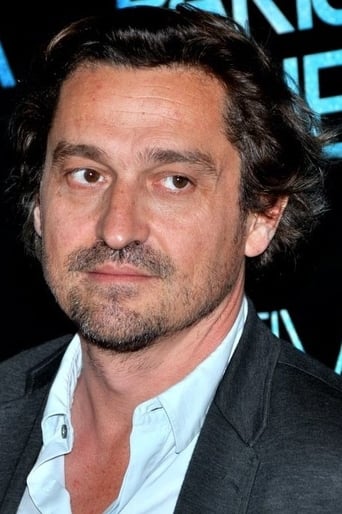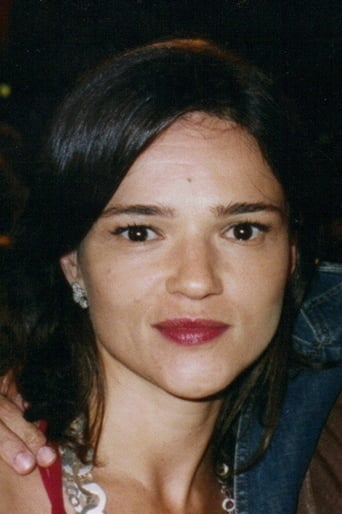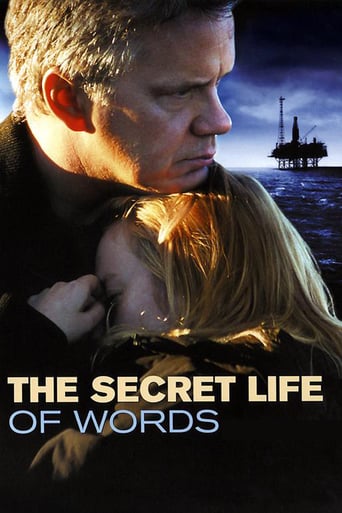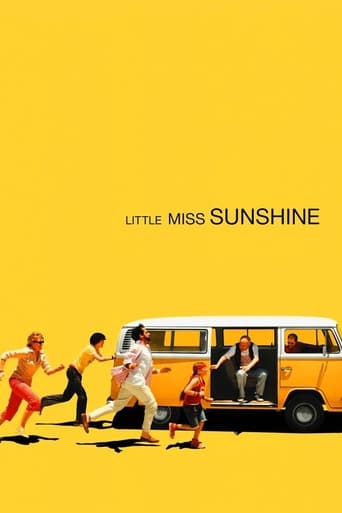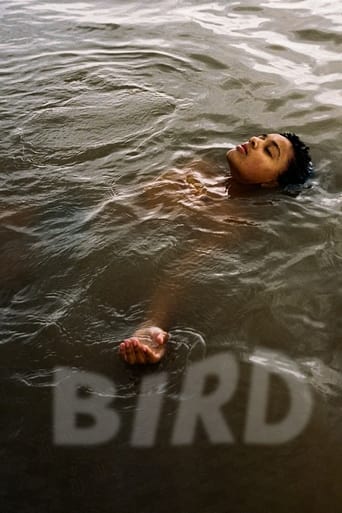Father of My Children (2010)
Grégoire Canvel has everything a man could want. A wife he loves, three delightful children and a stimulating job. He's a film producer. Discovering talented filmmakers and developing films that fit his conception of the cinema-free and true to life-is precisely his reason for living. Yet his prestigious production company, Moon Films, is on its last legs. Too many productions, too many risks, too many debts. Storm clouds are gathering. But Grégoire ploughs on at all costs. Where will his blind obstinacy lead him?
Watch Trailer
Cast
Similar titles



Reviews
Simply Perfect
Sadly Over-hyped
Best movie ever!
The film's masterful storytelling did its job. The message was clear. No need to overdo.
This film gave me the kind of experience I hope for when watching French movies: A character driven, intimate story, which so involved me that I feel as if I'd been away on a trip to France. The performances were authentic & lean. The scenery, both interior shots of apartments & buildings, as well as exterior shots of street life, made me feel as if I was in Paris. I was engrossed as to how the characters reacted to the heavy subject matter & how the story line progressed. The film has great depth without feeling heavy.A reviewer here on IMDb commented about how they didn't like the scenes which were not driving the story line, but for me, that's what I love about (some) French Cinema: a character walks from point A to point B or a character orders coffee while awaiting an important appointment. These connecting scenes are the stuff of real life & enable the viewer to identify with the character. Everyone experiences those mundane moments & knows what it feels like.Except for the main character Gregoire, I did not judge the reactions of the other characters: I simply observed their reactions to the serious events that befell them.The final scene was darkly humorous: Doris Day sings "Que Sera, Sera" as the characters flee Paris, leaving behind the life they had loved.
(Spoilers) This meditation on a suicide left me somewhat unsatisfied. It is the story of Grégoire Canvel, a successful French movie producer, and his family. The first part of the movie introduces us to the Canvel family: Grégoire, his wife, and three attractive young daughters. There are scenes that illustrate the great affection that exists among all members of this family, like Grégoire playfully searching for his youngest daughter who is hiding under the covers in her bed.We are led to believe that Grégoire is a typical, harried businessman who spends most of his life on his cell phone. However, as the movie progresses it is seen that Grégoire's company is in some serious financial trouble and his business is on the verge of bankruptcy. Hints are dropped that Grégoire himself may be in some deep emotional waters. All of this is well and good and I waited to find out the resolution to this unfortunate situation, but I was not prepared for Grégoire's abrupt suicide about half way through the movie. Indeed his suicide is mystifying since Grégoire's family life is so positive. I wanted more details on the motivation for the suicide--could it have simply been the financial problems as implied? That seems too simple an explanation. Grégoire is seen burning some documents before ending his life; what were those? Why was the audience denied knowing this, since that could have helped in understanding the suicide. Grégoire mentioned that as a last resort he could tap into his wife's monies. He never acted on that. Why was that? Was it even a possibility?The second half of the movie details the family's reaction to Grégoire's fatal act. This part of the movie plays out in a believably realistic way. Grégoire's wife Sylvia tries to finish up the projects that her husband had underway at the time of his death. If she had substantial financial reserves, she did not use those to accomplish her goals. Each of the three girls copes in her own way--life goes on.In the end I felt like a voyeur dropping on in this family's tragedy and I had to question the value of the movie. It was not a warning to pay closer attention to the emotional state of others, since I think that there was no way that Sylvia could have guessed the gravity of Grégoire's mental state. Maybe an admonition that people should be more forthcoming in communicating what they are thinking? On average in France there are three male suicides for every female suicide. Does this movie help in understanding that statistic?The movie is well filmed and the actors are in good form. As a bonus there is a small travelogue of Parisian scenes as Grégoire drives around Paris. But I was left wanting more.
In response to previous reviews, commenting on this movie's failure to live up to its so- called "roller-coaster of emotions" hype, I agree. Happily. This movie is not an edge of your seat, thrill at every corner, emotion jerker- and that's what makes it superb. Hansen- Løve binds this movie to a sense of realism which i find translates perfectly to its audience, and relates to its audience. The movie illustrates Grégoire's progression towards suicide, and the life for the family he leaves behind, in a non- appeasing, human way. Grégoire's story may not provide the audience with explanations, excuses or a nice dramatic lead up to his death. Scene by scene, the audience is given mixed messages from Grégoire, leading us to feel unprepared for his sudden death. But that is suicide, in its realest form. And Hansen- Løve has successfully translated this feeling from the Canvel family to the audience. In justification of the so called "pointless" scenes, a scene sampling the relationship between the elder daughter and the writer boy who met with Grégoire, or another sampling the elder daughters pursuance of her half brother, is completely adequate. The daughter is rebuilding her life after Grégoire's death, which cannot be shown to us in a detailed, flowing, coherent way- because that is not the way she is living it. The broken, inconsistent scenes of the elder daughter's, the younger daughters' and the wife's lives, are shown to the audience in the same way they are lived by the characters.The scenes prior to Grégoire's death, however, construct a solid image of the emotional bond and unity of the 5 members of the Canvel family- scenes such as a giggling Valentine being discovered by Grégoire, hiding in his bed, or Billie floating alone in the pool of water, being watched over by her mother. I think in order to profit from this movie, the audience's expectations should be shifted from a "rollercoaster ride of emotions" kind of movie- complete with drama, coherence, and a relevant, easy to follow plot- to that of a sincere expression of life as it is, and how it continues- captured on film. In this respect, it is superb.
Seeing "Le père de mes enfants" you would think that its writer-director, Mia Hansen-Løve, is in the last part of her career, that she has gone through the ups and downs of a long life, has made peace with it and is now able to contemplate the world with wisdom and understanding. And you would be totally wrong. Mia Hansen-Løve was only twenty-seven when she made this profound film.She took her inspiration from two real-life models, Humbert Balsan, a brilliant film producer who took his life at the age of 51 when he realized he would go bankrupt, and Donna Balsan, his wife, who, for all her grief, did her utmost to save Ognon Pictures, her husband's company, after his death. But mind you, this is no straight biopic. For instance, the names have been changed; Grégoire Canvel (the screen equivalent of Balsan) has three kids instead of two; the way he kills himself is different; Bela Tarr, the Hungarian director Balsan had trouble with at the time of his death, has become Stig Janson, a Swedish helmer; and so on Even Mia Hansen-Løve herself, who is part of the story, is represented indirectly, by Arthur,a young film maker that Grégoire wants to produce but finally can't ( a reference to "Tout est pardonné", Hansen-Løve's former film, whose production was taken over by Pelléas Films after Balsan's suicide). Oddly enough, Arthur happens to be interpreted by Igor Hansen-Løve, Mia's own brother. Sure, "Le père de mes enfants" is not the exact telling of the life of one of the most original producers of French cinema, but it is very close to reality and perhaps even closer than if it was a mere biopic, since what Mia Hansen-Løve tries to do is to capture the essence of a man's soul, not only to piece facts together.To achieve this end, the writer-director divides her story into two distinct parts. The first one presents Grégoire in his professional as well as in his family life, both tending to intermingle to the despair of Sylvia, Grégoire's wife. The long opening sequence during which Grégoire uses his mobile phone whatever the place he is in is explicit in this respect. At his country house on the weekend, Grégoire is the loving father of three delightful daughters and Sylvia's faithful companion. At his Paris office he is an industrious man, the enthusiastic, tireless, staunch defender of auteur film-making, whether French or foreign. But money troubles become more and more insistent, preventing him from indulging his passion serenely. The documentary aspect is excellent: the account of the way the small production company works day after day is very realistic without being boring. But interesting as this part is, it would not be enough to make "Le père de mes enfants" something else but a good film. What makes it really outstanding is the second part in which Mia Hansen-Løve explores the consequences of Grégoire's suicide on his nearest and dearest and on his collaborators. And she does it with a truly magic touch. She first very intelligently disposes of the set pieces of the discovery of the corpse and of the funeral. Instead, she directly cuts to the deep sorrow experienced by Grégoire's wife and daughters, the feeling of unacceptable loss, of resentment against the deceased who abandoned them. Then she shows how the characters evolve, slowly coming to terms with the situation, gradually realizing that Grégoire's life has been so rich, has brought them so much that he is now part of them, that what he accomplished in the artistic domain before committing suicide has not disappeared. They know now that his spirit will go on living, through his films, through the persons they have become thanks to him A sad story but which does not make you sad in the end, for Mia Hansen-Løve doesn't take morbid delight in the evocation of death and the damages it causes. On the contrary, it is life she pays a tribute to when she films wonderful scenes of family life with or without Grégoire, often in a sunny atmosphere. In the end, we get the comforting feeling that arrogant Death finally admits defeat.The actors, although practically unknown, are very convincing. Louis-Do de Lencqueseing is fascinatingly close to his model and to his natural charm. His own teenage daughter Alice de Lencquesaing, who plays Grégoire's oldest daughter, is simply wonderful, displaying a wealth of unaffected beauty and hypersensitivity. Alice Gautier and Manelle Driss, who play her little sisters, are full of life, and Chiara Caselli, in the difficult role of Gregoire's wife, rings true throughout.Florent Dudognon, who reviewed "Tout est pardonné", Hansen-Løve's first feature on Evene on 30-7-2007, used the following terms to qualify the film: "touching, sensitive, sweet, unmarred by pop psychology crap, played with restraint". I guess he will not change a word if he comments on "Le père de mes enfants", a moving picture you must not miss on any account.
